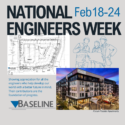Technical Unit Credit from Operator Certification Program Office Available Performing Energy Audits Improving Pump & Blower Efficiency Identifying Energy Recovery Opportunities Discovering “Green” Generation Technologies Getting Electric Utility Rebates Wasting Money By Baseline Water/Wastewater Engineering No doubt these topics are all hot issues, but how do you find the time to learn everything you need… Read more »
Author: Baseline
Colorado Transportation Funding
By Chris Rundall Here in Colorado, consumers pay a 40.4 cents-per-gallon tax on gasoline: of this tax, 18.4 cents goes to the federal government and 22 cents goes to the state. The state tax portion, which funds maintenance and improvements to our state’s roads and bridges, has not changed since 1991. However, inflation and improved vehicle… Read more »
Urban Infill Development
In the Denver Metro area and Northern Colorado when “urban infill” projects are mentioned, we might think of the downtown Denver area just North of Coors Field or Stapleton as prime examples of the term. Wikipedia defines infill as “the use of land within a built-up area for further construction; especially as part of a… Read more »
Lessons Learned about Low-impact Development
By Noah Nemmers, PE Low-impact development (LID) is a term used to describe a land planning and engineering design approach to managing storm water runoff. LID emphasizes conservation and use of on-site natural features to protect water quality. This approach implements engineered small-scale hydrologic controls to replicate the pre-development hydrologic regime of watersheds through infiltrating, filtering, storing, evaporating, and detaining runoff close to its source. Baseline has been involved in numerous… Read more »
Fracking and Water Usage
By Rick Behning, PE One of the concerns related to the fracking process is water usage. Kenneth Carlson, co-director of the Colorado Energy-Water Consortium, was interviewed for a recent Greeley Tribune article. The article explains that 0.1 percent of water diverted for beneficial use will be used for fracking over the 5 year span from… Read more »
Economic Downturn and Land Planning for Self-serve Storage
By Rick Behning, PE The economic downturn of the past several years, while devastating to the real estate and financial markets, has simultaneously created opportunity for many industries. Rental properties are in high demand, many law fields are busier now than ever, and car mechanics are swamped with aging vehicle maintenance. One wouldn’t expect land… Read more »
Utilities Energy Audits
By Baseline Water/Wastewater Engineering In the water/wastewater industry, the popular “energy audit” is what many companies are doing to promote sustainability, a reduction in carbon footprint, and lower operating costs…but are they being done correctly? The answer, more often than not, is no. Many of these companies recommend simply replacing a motor or adding a… Read more »
De-Mystifying ALTA Surveys
By Aaron Demo, PLS Professional Land Surveyors are constantly helping clients understand what they need when they say they need a “survey.” Surveys can range from Improvement Location Certificates (“ILCs”) to the infamous “ALTA surveys”. Surveys are generally subject to state and local regulations, but can still vary in dramatic ways. The ALTA survey is… Read more »
Colorado Floodplain Rules
In an effort to increase public safety and reduce flood losses across the state, the Colorado Water Conservation Board issued new floodplain rules and regulations that became effective on January 14, 2011. These rules build off of the FEMA rules with the hope to provides uniform standards for regulatory floodplains in Colorado and activities in… Read more »
Bakken and North Dakota Development
As of 2012, North Dakota has overtaken California to become the third-largest U.S. oil-producing state, as fracking technology has boosted shale oil output. Production has doubled in the three years since 2009. The boom in oil production in the region has also effectively cut the Midwestern state’s unemployment rate to the lowest in the country,… Read more »
Colorado’s Stringent Floodplain Rules
By Rick Behning, PE In an effort to increase public safety and reduce flood losses across the state, the Colorado Water Conservation Board issued new floodplain rules and regulations that became effective on January 14, 2011. These rules build off the FEMA rules. The hope is to provide uniform standards for regulatory floodplains in Colorado… Read more »
What to Do with Fracking’s Flowback Water?
By Baseline Water/Wastewater Engineering Approximately one million gallons of “flowback” water return to the surface, and is typically hauled to a disposal site where it is injected thousands of feet into the ground, a process environmentalists and some residents of oil fields worry may contaminate ground water. Many agree that this practice is not sustainable… Read more »
How to Invest for Potential Fracking Regulation
The following article was published on www.bakkenoil.org on January 23, 2012. Michael Filloon of Seeking Alpha has a five-part article series on investing for potential of EPA regulation of fracking as a result of public concerns about water usage and contamination. Below is a synopsis of his excellent analysis, but for an in-depth assessment of how… Read more »
U.S. Water Infrastructure Receives Nearly Failing Grade
By John McLain, PE The Water Innovations Alliance (WIA) recently completed an assessment of the state of the U.S. water infrastructure, which was given an overall grade of D- by the American Society of Civil Engineers in its most recent infrastructure report card. Underlying that nearly failing grade, WIA produced some startling statistics in a recent newsletter… Read more »
Sustainable Pavement Design – Pavement’s Future
By Noah Nemmers, PE As pavement technology continues to change and advance, a major emphasis is being put on environmental stewardship. Highway administration’s efforts are increasingly aimed at the industry’s overall use of recycled materials, environmental and ecological constrains, as well as the Long-Term Pavement Performance. Better determining the current condition of the country’s pavements… Read more »
Colorado’s Current Snowpack and Reservoir Storage
By Chris Rundall, PE In the state of Colorado, where our offices are headquartered, there is constant concern over snowpack levels and reservoir fill. Because snowfall in the Rockies provides the main source of water for the state’s reservoirs, we keep a close eye on annual percentages and averages. Currently, the statewide snow pack is… Read more »
Weld County Oil and Gas Boom on Horizon
By Rick Behning, PE Billions of dollars have been earmarked to be spent in the Niobrara Shale in Northern Colorado and Southern Wyoming. According to an article published January 4 in The Coloradoan: “The Niobrara shale spreads across northeast Colorado, but it’s only about 400 feet thick and thousands of feet underground. Because the shale is so thin,… Read more »
Moss Street Bridge Girders Placed today at NREL
No matter who you are, this is impressive. 105′ bridge girders installed today with a huge crane with 400′ telescoping boom!
Congrats to Aaron Demo–Now Professional Land Surveyor
Looks pretty good with PLS after his name. Get ready for your registration bonus check. You have earned it.
Uranium Skid Gets Benkelman Pumping Treated Water
Baseline is helping the City of Benkelman, Nebraska, solve its source water-quality problems. We’ve installed the uranium skid below. Now it’s time to hook everything up and start pumping treated water!



